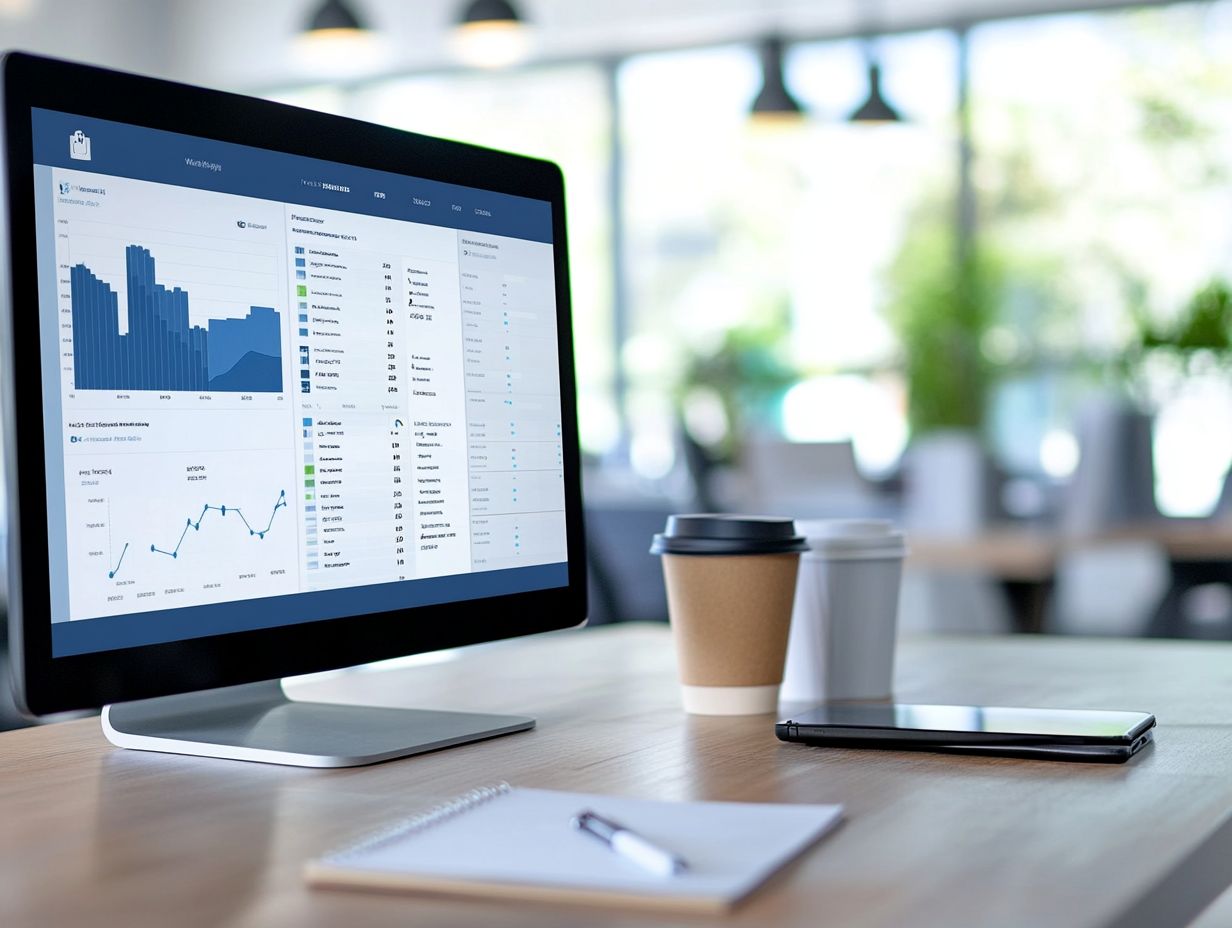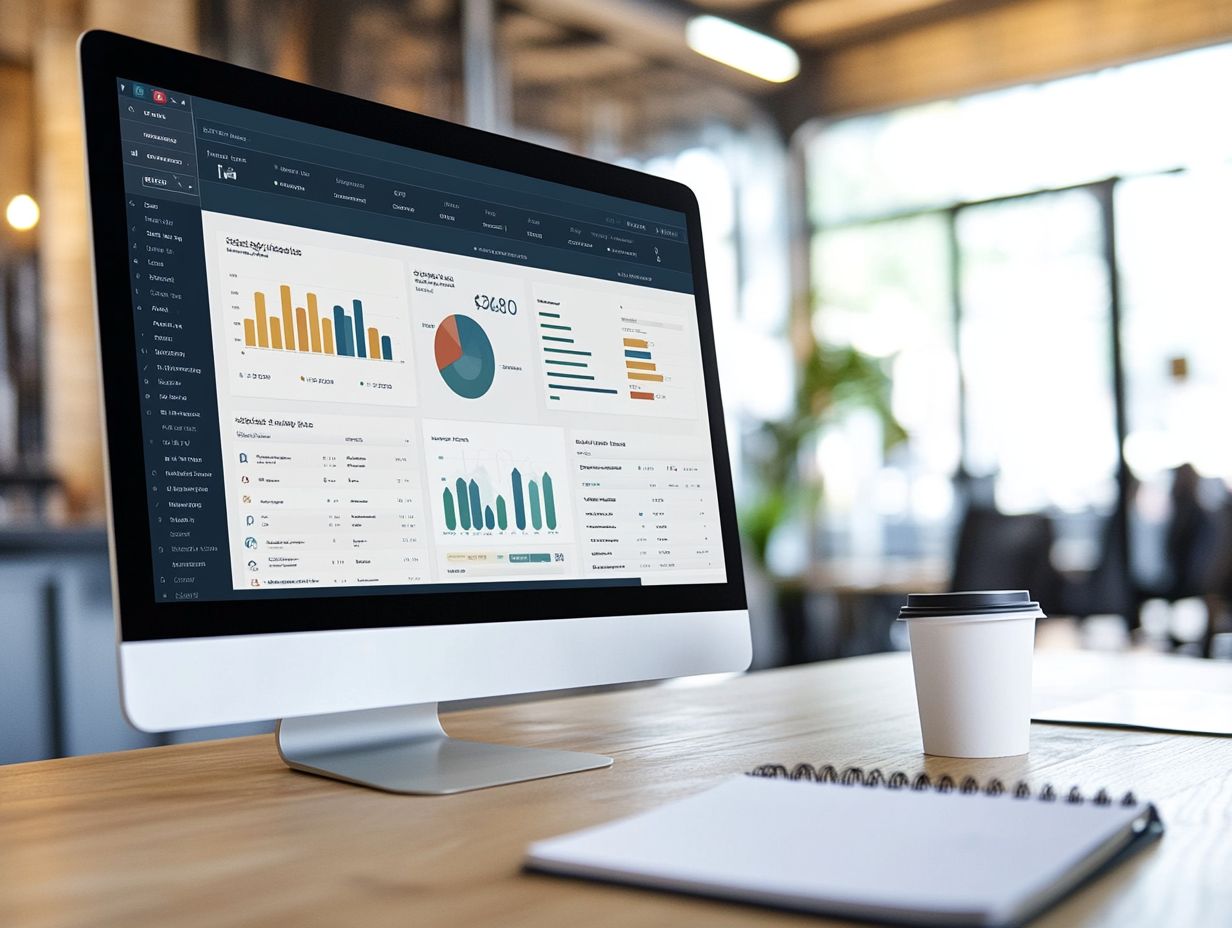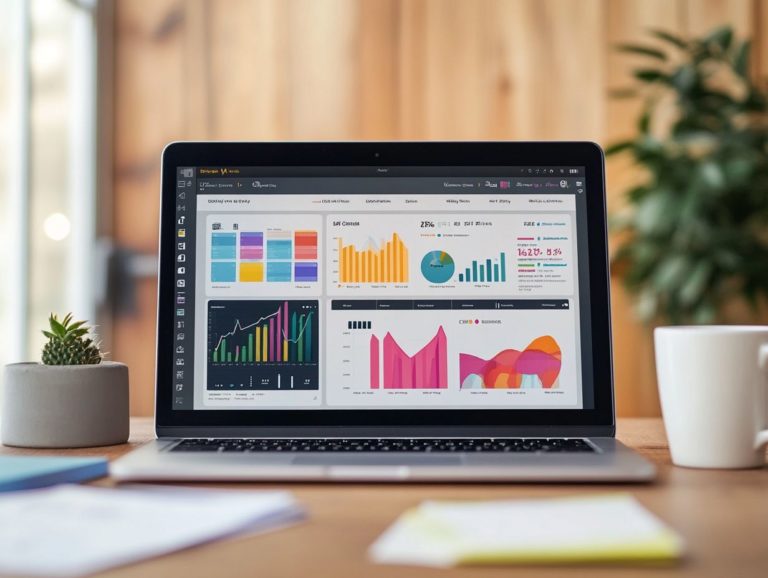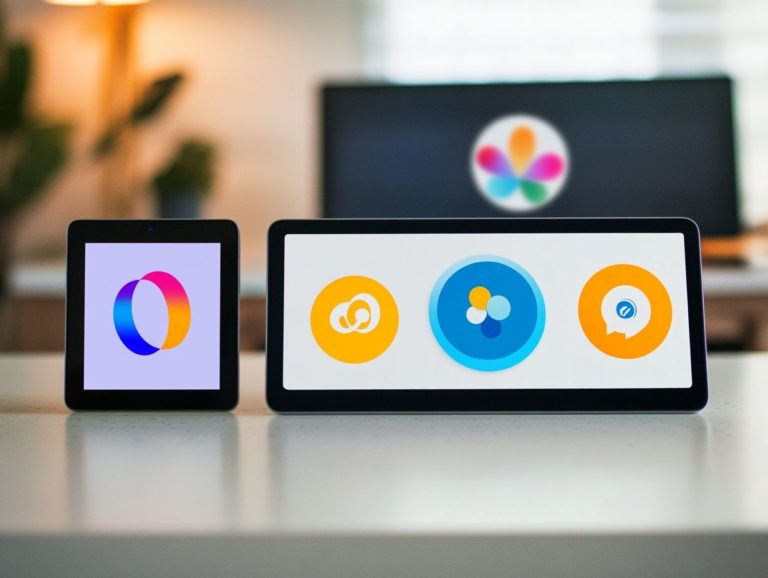40. 5 Features to Look for in Nonprofit CRM
In today s competitive landscape, nonprofits like yours depend on effective management tools to enhance operations and amplify impact. Unlock the full potential of your nonprofit with a powerful CRM!
A Nonprofit CRM (Customer Relationship Management) system helps organizations manage relationships with donors and volunteers. It is an invaluable asset, effortlessly streamlining donor management, volunteer coordination, fundraising efforts, and event planning.
This article delves into the essential features of a Nonprofit CRM, underscoring its significance and offering insights on how to maximize its benefits. Whether you re contemplating a CRM for the first time or seeking to optimize your existing system, you ll discover actionable tips and emerging trends to guide your journey toward greater success.
Contents
- Key Takeaways:
- 1. Donor Management
- 2. Volunteer Management
- 3. Fundraising and Donation Tracking
- 4. Event Management
- 5. Reporting and Analytics
- What Is a Nonprofit CRM and Why Is It Important?
- How Can a Nonprofit CRM Help with Donor Management?
- What Are the Benefits of Using a Nonprofit CRM for Volunteer Management?
- How Can a Nonprofit CRM Help with Fundraising and Donation Tracking?
- What Features Should a Nonprofit CRM Have for Event Management?
- Why Is Reporting and Analytics Important in a Nonprofit CRM?
- What Are the Key Considerations When Choosing a Nonprofit CRM?
- How Can a Nonprofit Maximize the Use of Their CRM?
- What Are the Common Challenges in Implementing a Nonprofit CRM?
- What Are the Potential Risks of Not Using a Nonprofit CRM?
- How Can a Nonprofit Successfully Integrate a CRM into Their Organization?
- What Are the Future Trends in Nonprofit CRM?
- Frequently Asked Questions
- What is a nonprofit CRM?
- Why is it important for nonprofits to have a CRM?
- What are the 5 features to look for in a nonprofit CRM?
- Can a nonprofit CRM integrate with other software tools?
- How can a nonprofit determine if a CRM is user-friendly?
- Is a nonprofit CRM only for large organizations?
Key Takeaways:

- Effective donor management is crucial for nonprofit success.
- A good nonprofit CRM should have features for volunteer management, fundraising, event planning, and reporting.
- Integrating a CRM can bring numerous benefits, such as improved efficiency, better data tracking, and enhanced donor engagement.
1. Donor Management
Effective donor management is essential for charitable organizations like yours that aim to boost fundraising efforts and nurture strong relationships with supporters. Utilizing advanced nonprofit CRM systems is vital for organizing data and enabling strategic engagement.
By tapping into donor data, you can create robust profiles that inform personalized communication and outreach strategies. Segmenting your donors lets you create targeted messages that resonate deeply, increasing engagement.
Consider implementing strategies for donor engagement such as:
- Targeted email campaigns showcasing success stories of funds in action.
- Personalized thank-you notes that acknowledge past contributions.
Using a nonprofit CRM to automate these communications not only streamlines your processes but also ensures that no donor feels overlooked. Tracking interactions across various channels will help you refine your approaches over time, strengthening your relationship-building efforts and fostering loyalty among your supporters.
2. Volunteer Management
Volunteer management is essential for the success of nonprofit organizations. It enables you to effectively recruit, train, and retain dedicated individuals who are passionate about your mission and operations.
By utilizing a nonprofit CRM, you can refine your approach to volunteer management, transforming it into a more structured and efficient process. This system allows you to segment your supporters based on their skills, interests, and availability, ensuring that every volunteer is matched with tasks that align perfectly with their strengths.
Implementing effective communication strategies, such as personalized emails and targeted messaging, can deepen engagement with your volunteers. With the right tools at your disposal, you can recognize your volunteers through automated appreciation messages or milestone tracking, reinforcing their commitment and inspiring future participation.
3. Fundraising and Donation Tracking
Fundraising and donation tracking are essential elements of your nonprofit strategy. They give you the power to monitor your fundraising efforts and refine campaigns to maximize contributions from your supporters.
Understanding donor behavior and preferences is crucial for establishing lasting relationships. By implementing effective fundraising strategies and leveraging straightforward data tracking, you can identify trends and patterns that will inform your future campaigns.
For example, utilizing donor segmentation or engagement tracking allows you to tailor your outreach and communication in a way that resonates with your audience. Incorporating robust data reporting tools transforms raw information into actionable insights, enabling you to refine your approaches effectively.
This dynamic analysis not only enhances the visibility of your fundraising efforts but also gives you the power to adapt and innovate, ensuring sustained support and engagement from your donor base.
Start exploring how a Nonprofit CRM can transform your organization today!
4. Event Management
Effective event management is crucial for nonprofits like yours that aim to elevate donor engagement while executing impactful fundraising campaigns that truly resonate with supporters.
To achieve this, ensure your event management tools within a nonprofit CRM include key features every nonprofit CRM should have.
- Customizable registration forms
- Integrated ticketing systems
- Real-time reporting dashboards
These tools simplify tracking event registrations. They create a seamless experience for your attendees.
You can further enhance supporter engagement during events by incorporating interactive sessions, personalized communications, and utilizing social media platforms to broaden the event’s reach. By meticulously tracking registrations and engagement, you ll be able to refine your strategies for future events, identify potential advocates, and cultivate lasting relationships that contribute to your organization s mission.
5. Reporting and Analytics
Reporting and analytics are essential components of nonprofit CRM systems, offering you valuable insights into donor behaviors and the effectiveness of your fundraising strategies.
By monitoring key metrics, you identify trends and forecast future giving. This helps tailor your outreach efforts to engage donors more effectively.
Leveraging analytics tools allows you to centralize data, providing seamless access to comprehensive donor histories and engagement levels across various platforms.
Custom reports take this a step further by distilling complex data into easy-to-understand formats. This enables you to pinpoint which fundraising avenues are thriving and which may need a fresh strategy.
This strategic insight gives you the power to make informed decisions, ultimately enhancing the efficiency and impact of your fundraising efforts.
What Is a Nonprofit CRM and Why Is It Important?

A Nonprofit CRM (Customer Relationship Management) system is specialized software designed for charitable organizations. It helps manage donor data efficiently and streamline fundraising efforts.
By bringing together various facets of donor management into a single platform, these systems enable you to track contributions, monitor engagement history, and segment donor demographics seamlessly. This functionality allows you to customize your communication strategies, ensuring that each interaction resonates on a deeper level.
The automation features of a nonprofit CRM simplify your everyday tasks, such as sending thank-you messages or reminders for upcoming events. To enhance your understanding, you might want to explore the key features to compare in CRM software. This boosts efficiency and frees up your team to concentrate on mission-oriented activities.
This organized data helps you make informed decisions, allowing you to strategically plan your fundraising efforts based on insights derived from past donor behaviors.
How Can a Nonprofit CRM Help with Donor Management?
A nonprofit CRM system significantly elevates your donor management game by equipping you with robust tools for tracking donations, organizing donor profiles, and incorporating essential CRM features for B2B companies to craft strategies tailored to enhance donor retention.
These systems give you the power to meticulously monitor each contribution, paving the way for personalized communication and meaningful engagement.
By developing detailed donor profiles that capture preferences, past interactions, and feedback, you can tailor your outreach efforts to make each donor feel genuinely valued. This level of personalization cultivates a deeper emotional connection, which is crucial for boosting donor loyalty.
Automated reminders for follow-ups and acknowledgment of contributions help ensure that your donors remain engaged and appreciated.
When donors feel recognized and receive tailored communications, they are more likely to renew their support. This leads to higher retention rates, which are crucial for your nonprofit’s success!
What Are the Benefits of Using a Nonprofit CRM for Volunteer Management?
Using a nonprofit CRM for volunteer management brings a wealth of benefits your organization can t afford to overlook. You ll experience enhanced communication strategies, improved supporter segmentation, and effective engagement tools that truly foster volunteer relationships.
This innovative approach not only simplifies the organization of volunteer efforts but also ensures every individual s contributions are acknowledged and appreciated. With automated messaging features, you can maintain regular contact with your volunteers, sharing updates and expressing gratitude this builds a deeper sense of community.
The CRM also enables personalized outreach tailored to volunteers interests and past activities, helping them connect deeply with your mission! Focusing on communication and recognition boosts volunteer satisfaction, boosting long-term commitment and enhancing the overall effectiveness of your nonprofit initiatives.
How Can a Nonprofit CRM Help with Fundraising and Donation Tracking?
A nonprofit CRM is essential for your fundraising efforts, offering strong tools for tracking donations and analyzing data. Understanding the key features of CRM for event management can significantly enhance your strategies to maximize donor contributions.
These systems empower you to gain valuable insights into donor behaviors and preferences, allowing for outreach that truly resonates with each supporter. By leveraging sophisticated analytics, you can examine historical donation patterns to pinpoint peak giving times, ensuring your campaigns are perfectly timed to match donor readiness.
Utilizing tools like Tableau or Google Analytics can elevate this process further, providing visual data representations that reveal trends and engagement opportunities.
By harnessing these resources, you can refine your messaging and approach, ultimately boosting donor retention and securing long-term financial support for your organization.
What Features Should a Nonprofit CRM Have for Event Management?
For effective event management, your nonprofit CRM should provide features that streamline event planning, foster donor engagement, and track event registrations linked to your fundraising campaigns. Consider looking for key CRM features for startups to enhance your efforts.
These features help you coordinate logistics smoothly, ensuring every detail shines with your organization’s mission. By integrating engagement strategies, like personalized communication, you can significantly strengthen your connection with supporters during events.
Tools that automate thank-you emails or send reminders keep your audience informed and energized. Real-time data analytics are invaluable, offering insights into attendee behavior that enable you to refine your outreach efforts and elevate future events.
This approach ultimately drives greater involvement and support for your cause.
Why Is Reporting and Analytics Important in a Nonprofit CRM?
Reporting and analytics serve as essential pillars of a nonprofit CRM, giving you the power to track crucial metrics, analyze donor histories, and make informed, data-driven decisions to enhance your fundraising initiatives.
These tools grant you valuable insights into donor behavior, helping you identify trends and preferences that can shape your future engagement strategies.
By leveraging the capabilities of data analytics, you can determine which campaigns resonate most with your supporters, allowing for a more effective allocation of resources.
With these insights, you can group your donors, customizing your communication and outreach efforts to resonate with specific groups.
Ultimately, this deeper understanding fosters stronger relationships and cultivates increased donor loyalty, paving the way for elevated fundraising strategies and financial sustainability.
What Are the Key Considerations When Choosing a Nonprofit CRM?

Choosing a nonprofit CRM? Focus on donor management, customization, and user experience by following essential CRM practices for nonprofits. Make sure it fits your organization’s needs perfectly.
Pricing is another critical element that can significantly impact your budget. Assess the cost in relation to the features provided.
Don t overlook integration with your existing systems. Seamless connectivity can enhance operational efficiency and eliminate separate data that can’t easily be shared.
A user-friendly interface is vital. Your staff should be able to navigate the software effortlessly, improving training times and reducing frustration.
Together, these considerations shape your organization s ability to manage relationships, streamline operations, and effectively achieve its mission.
How Can a Nonprofit Maximize the Use of Their CRM?
Maximize your CRM’s effectiveness by focusing on automation and data centralization. Implement donor engagement strategies that resonate with your mission and goals.
By prioritizing these steps, you can enhance operational efficiency and cultivate stronger relationships with your supporters. Automation tools streamline communication, allowing your staff to devote time to more strategic initiatives.
Centralizing your data ensures all information about donors, campaigns, and interactions is accessible and actionable, leading to personalized outreach.
This comprehensive approach nurtures vital donor relationships and fosters a sense of community, paving the way for sustainable funding and long-term impact.
What Are the Common Challenges in Implementing a Nonprofit CRM?
Implementing a nonprofit CRM can come with challenges like user resistance, data migration issues, and the need for adequate training and support for your staff. These obstacles often arise from a lack of familiarity with the new technology and how it fits into daily workflows.
Wondering how to tackle user resistance? Involve your team early in the selection and planning stages to ensure the chosen system aligns with their needs and secures their buy-in.
For data migration, establish a clear strategy with regular backups and phased transfers to reduce disruptions.
Provide thorough training sessions and ongoing support. This boosts staff confidence and productivity, fostering a culture of adaptability and continuous learning as they navigate their new systems.
What Are the Potential Risks of Not Using a Nonprofit CRM?
Ignoring a nonprofit CRM? That could mean missed donations and lost opportunities! Neglecting to utilize a nonprofit CRM exposes you to significant risks, including inefficient donor management, scattered data, and missed fundraising opportunities that impede your organization s growth.
Without a centralized system to track donor interactions and preferences, you might reach out to loyal supporters with generic messages, creating frustration and disengagement.
Crucial information about key fundraising campaigns could disappear into a sea of spreadsheets, leading to missed deadlines for grant applications or fundraising events. This lack of organization erodes trust and enthusiasm among your donors, hampering your ability to nurture vital relationships for long-term financial sustainability.
As a result, failing to implement a robust CRM may lead to a decline in donations, negatively impacting your mission and outreach efforts.
How Can a Nonprofit Successfully Integrate a CRM into Their Organization?
Successfully integrating a CRM into your nonprofit organization requires meticulous planning, effective staff training, and a strategic approach to data migration. This ensures a seamless transition and enhances user experience.
Establish a clear timeline and define specific milestones. Engaging your team members during the planning phase will help you identify potential challenges and assess their comfort levels with the technology.
Tailor your training sessions to suit different user roles. Equip everyone with the skills they need to navigate the new system confidently. Implement a comprehensive data migration strategy to ensure that information is transferred accurately without any loss.
By prioritizing these elements, you can minimize disruption and create a positive atmosphere. This makes the transition to a new CRM not only manageable but also a resounding success.
What Are the Future Trends in Nonprofit CRM?
The future of nonprofit CRM is set to embrace innovation. Trends like increased automation, advanced data analytics, and enhanced donor engagement strategies are rapidly transforming how nonprofits work.
These changes aren’t just abstract concepts; they’re actively redefining how organizations operate and connect with their supporters. Many nonprofits are tapping into artificial intelligence to predict donor behaviors, allowing them to tailor their communications with precision.
Data analytics is crucial in this mix, helping you identify key trends and insights to optimize fundraising efforts. For example, a local health nonprofit adopted automated outreach programs, leading to a remarkable 30% increase in donor retention.
Such success stories demonstrate how these emerging tools can significantly boost operational efficiency and cultivate stronger relationships with donors.
Frequently Asked Questions

What is a nonprofit CRM?
A nonprofit CRM, or constituent relationship management system, is a software tool designed specifically for nonprofits to manage their relationships with donors, volunteers, and other stakeholders. CRM stands for Customer Relationship Management. It helps organizations track interactions, donor data, and fundraising efforts.
Why is it important for nonprofits to have a CRM?
Nonprofits rely heavily on relationships with donors, volunteers, and other supporters to fulfill their mission. A CRM helps them manage these relationships more effectively by organizing data and streamlining communication. This results in better donor retention and increased fundraising success.
What are the 5 features to look for in a nonprofit CRM?
The 5 key features to look for in a nonprofit CRM are fundraising management, donor management, volunteer management, communication tools, and reporting and analytics. To learn more about these crucial aspects, check out the must-have CRM features for nonprofits. These features are essential for nonprofits to effectively manage their relationships and fundraising efforts.
Can a nonprofit CRM integrate with other software tools?
Many nonprofit CRMs offer integrations with popular software tools such as email marketing platforms or accounting software. This can help streamline processes and eliminate the need for manual data entry. When evaluating a CRM, consider exploring strategies for effective CRM in nonprofits to ensure you check for available integrations.
How can a nonprofit determine if a CRM is user-friendly?
A user-friendly nonprofit CRM should have a clean and intuitive interface, easy customization options, and helpful customer support. You can also read reviews of the best CRMs for nonprofits or request a demo to get a feel for the system’s ease of use.
Is a nonprofit CRM only for large organizations?
No, nonprofit CRMs can be beneficial for organizations of all sizes. They can help smaller nonprofits with limited resources manage relationships and fundraising efforts more efficiently and effectively. There are also budget-friendly options available for smaller organizations.
Explore various CRMs today and find one that fits your organization s needs. Consider requesting a demo to see the features in action!






